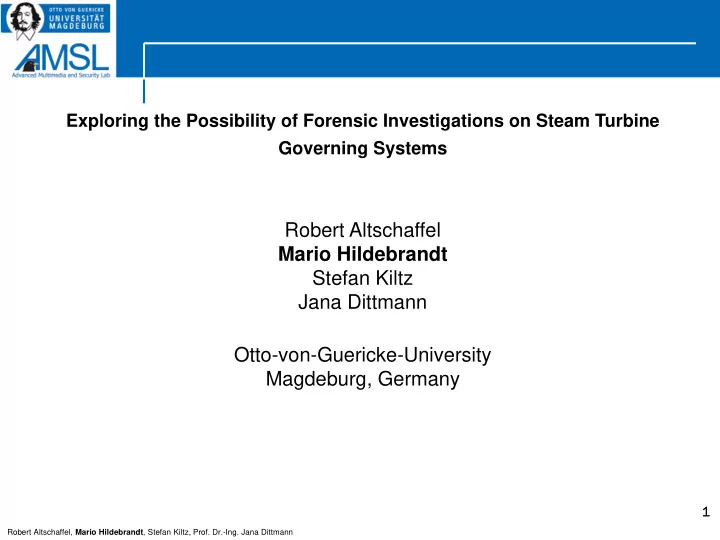

Exploring the Possibility of Forensic Investigations on Steam Turbine Governing Systems Robert Altschaffel Mario Hildebrandt Stefan Kiltz Jana Dittmann Otto-von-Guericke-University Magdeburg, Germany 1 Robert Altschaffel, Mario Hildebrandt , Stefan Kiltz, Prof. Dr.-Ing. Jana Dittmann
Outline • Introduction • Fundamentals – Steam Turbine Governing Systems – Computer Forensic Investigation • Generalized Steam Turbine Governing System – Data Streams – Possibilities for Forensic Investigation • Simulation Model of a STG System • Conclusion & Future Work 2 Robert Altschaffel, Mario Hildebrandt , Stefan Kiltz, Prof. Dr.-Ing. Jana Dittmann
Introduction • Industrial automation is a central aspect of modern power plants – Controls different functions – Relies on electronic control systems – Might be interconnected • Like any computer system, an industrial control system might fail – By attack or by accident • How can the events that led to such an incident be reconstructed? 3 Robert Altschaffel, Mario Hildebrandt , Stefan Kiltz, Prof. Dr.-Ing. Jana Dittmann
Steam Turbine Governing Systems • Steam Turbine Governing (STG) Systems are used as a starting point • Steam Turbine [Dic15] – Generates electric power by using steam pressure generated by the steam generator – Consists of a shaft connected to a number of blades – Steam turbine needs a stream with specific temperature and pressure – STG is used to ensure these characteristics • Steam Turbine Governing Systems – Have a range of sensors for temperature and pressure – Have valves as actuators ➢ Classical control system 4 Robert Altschaffel, Mario Hildebrandt , Stefan Kiltz, Prof. Dr.-Ing. Jana Dittmann
Forensics • Forensics = the reconstruction of events by using scientific methods – Events might be attacks or failures • Validation of a forensic examination depends on … – Integrity / Authenticity of the traces – Trustworthiness of the forensic method • Forensic Investigation on computer systems is a well-researched domain – Interest in specialized/connected domains (e.g. automotive, ICS) rises 5 Robert Altschaffel, Mario Hildebrandt , Stefan Kiltz, Prof. Dr.-Ing. Jana Dittmann
Computer Forensic Investigations 1/2 • Three principal sources of data (‘data streams’) [ALK17] – Communication • Data exchanged between components using physical network connections • Can only be gathered at the moment of transmission – Volatile data • Data stored in volatile memory which is lost after voltage loss and/or deactivation of a system • Can be gathered by querying the respective system for this data – Persistent data • Data stored in persistent memory • Can be gathered by querying the respective system for this data or by extracting the data directly from the component 6 Robert Altschaffel, Mario Hildebrandt , Stefan Kiltz, Prof. Dr.-Ing. Jana Dittmann
Computer Forensic Investigations 2/2 • Forensic model according to [KVD15] – Strategic preparation ( SP ) measures taken by the operator n prior to an incident. – Operational preparation ( OP ) measures of preparation after a suspected incident. – Data gathering ( DG ) measures to acquire and secure digital evidence. – Data investigation ( DI ) measures to evaluate and extract data for further investigation. – Data analysis ( DA ) measures for detailed analysis and correlation between digital evidence from various sources. – Documentation ( DO ) measures for the detailed documentation of the proceedings 7 Robert Altschaffel, Mario Hildebrandt , Stefan Kiltz, Prof. Dr.-Ing. Jana Dittmann
Generalized Steam Turbine Governing System • Understanding of components is essential to identify possible traces ➢ Creation of a generalized and simplified model for a STG system 8 Robert Altschaffel, Mario Hildebrandt , Stefan Kiltz, Prof. Dr.-Ing. Jana Dittmann
Generalized Steam Turbine Governing System – Data Streams • Allows Identification of the three forensic useable data streams Communication Volatile Memory Persistent Memory 9 Robert Altschaffel, Mario Hildebrandt , Stefan Kiltz, Prof. Dr.-Ing. Jana Dittmann
Simulation Model of a STG System 1/3 • Simulation environment to create data streams based on an abstract, simplified model • Objective: customizable setup to analyze forensic traces for various attack patterns • FlowNet-based model with simplified thermodynamics 10 Robert Altschaffel, Mario Hildebrandt , Stefan Kiltz, Prof. Dr.-Ing. Jana Dittmann
Simulation Model of a STG System 2/3 Digital Reading/PLC Input Network Data Valve Control Digital Reading/PLC Input: Impulse/Frequency Counter 11 Robert Altschaffel, Mario Hildebrandt , Stefan Kiltz, Prof. Dr.-Ing. Jana Dittmann
Simulation Model of a STG System 3/3 • Simulation model has to cover all operational modes – power-up, operation, power-down • Forensic investigation is not limited to attacks as a result of malicious intent – malfunctions are considered as well • Extension of the model: generator control and communication with the steam turbine governing control, HMI integration 12 Robert Altschaffel, Mario Hildebrandt , Stefan Kiltz, Prof. Dr.-Ing. Jana Dittmann
Conclusion & Future Work • Identification of possible data traces usable for forensic investigation in ICS environment within a power plant • A simplified generic model for STG systems is presented for supporting the forensic process by identifying data traces • The possibility of acquiring these traces has been investigated using a simulated environment • Future work requires practical confirmation on the results yielded in the simulated environment 13 Robert Altschaffel, Mario Hildebrandt , Stefan Kiltz, Prof. Dr.-Ing. Jana Dittmann
References Thank you for your Attention! References: • [Dic15] E. Dick, “Fundamentals of Turbomachines”, Springer, Dordrecht 2015 • [KDV15] S. Kiltz, J. Dittmann, C. Vielhauer, "Supporting Forensic Design - a Course Profile to Teach Forensics", IMF 2015 • [ALK17] R. Altschaffel, K. Lamshöft, S. Kiltz, J. Dittmann , “A Survey on Open Automotive Forensics”, SECUREWARE 2017 Contact information: Robert Altschaffel Mario Hildebrandt Department of Computer Science Department of Computer Science Research Group Multimedia and Security Research Group Multimedia and Security Institute of Technical and Business Information Systems Institute of Technical and Business Information Systems Otto-von-Guericke-University of Magdeburg Otto-von-Guericke-University of Magdeburg Universitaetsplatz 2 Universitaetsplatz 2 39106 Magdeburg, Germany 39106 Magdeburg, Germany EMail: robert.altschaffel@iti.cs.uni-magdeburg.de EMail: mario.hildebrandt@iti.cs.uni-magdeburg.de 14 Phone: +49 (391) 67 58046 Phone: +49 (391) 67 51603 Robert Altschaffel, Mario Hildebrandt , Stefan Kiltz, Prof. Dr.-Ing. Jana Dittmann
Recommend
More recommend